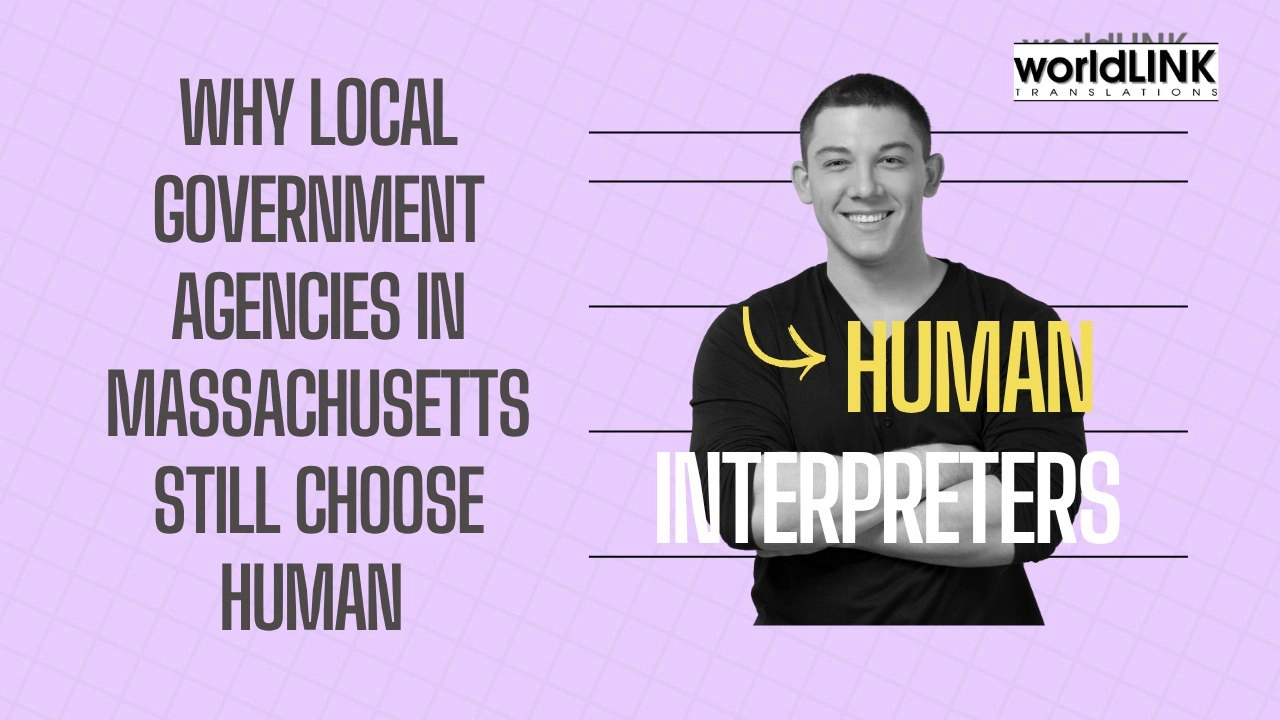As public services strive to become more accessible, especially in linguistically diverse states like Massachusetts, government interpreter services remain a critical link between agencies and the communities they serve.
While artificial intelligence (AI) is making waves in many industries, local government agencies in Massachusetts continue to invest in certified human interpreters, and for good reason.
Here’s why human interpretation remains the gold standard for public service language access in Massachusetts.
The Stakes Are High in Government Settings
In government contexts, whether it’s a courtroom, a public housing office, or a city council meeting, accuracy is non-negotiable. A single mistranslation during a benefits interview, legal proceeding, or emergency announcement can lead to serious consequences, including:
- Denial of essential services
- Legal misrepresentation
- Loss of trust in public institutions
That’s why local interpreting for public agencies must prioritize precision, confidentiality, and cultural nuance, qualities human interpreters bring to the table.
Why AI Falls Short
While AI interpreting tools can handle basic language tasks, they are not equipped for the complexities of public-sector communication. Here’s where machine-led interpretation struggles:
- Nuance and context: AI often fails to capture tone, subtext, and cultural implications.
- Emotionally sensitive topics: Topics like housing evictions, immigration status, or medical needs require empathy, something AI can’t deliver.
- Real-time problem-solving: Humans can adapt instantly to unexpected questions, code-switching, or clarifications in a way AI systems cannot.
In short, when the margin for error is razor-thin, human interpreter vs AI is not a fair comparison, humans win every time.
Legal & Compliance Requirements in Massachusetts
Massachusetts has established clear guidelines on interpreter use, especially for courts and other official bodies. Agencies are legally required to provide certified interpreters for government services in many contexts. Failure to do so can result in:
- Non-compliance with state laws
- Lawsuits and liability risks
- Civil rights violations under Title VI of the Civil Rights Act
Moreover, many local governments rely on Massachusetts interpreter compliance standards to ensure that interpreters are not only fluent but trained in legal terminology, confidentiality, and ethics.
Human Interpreters = Trust + Community Connection
Language isn’t just a communication tool, it’s a cultural bridge. Certified human interpreters bring more than words to the room:
- They build trust with non-English speaking residents.
- They foster community engagement by helping people feel heard and understood.
- They reflect the diversity of Massachusetts communities by offering dialect-specific interpretation.
This human touch builds lasting connections that AI simply can’t replicate.
Examples: Where Human Interpreters Make the Difference
In high-stakes environments, human interpreters play a vital role in ensuring fairness, clarity, and empathy. Consider:
- Legal interpreting in Massachusetts courts, where interpreters help defendants understand charges, rights, and proceedings.
- Public health announcements during emergencies, where miscommunication could affect community safety.
- Welfare and social services, where interpreters offer culturally sensitive support for families in distress.
These are not roles where a chatbot or AI system can step in. They require real-time thinking, emotional intelligence, and subject-matter expertise.
Why Massachusetts Agencies Still Choose Local Professionals
Agencies in Massachusetts continue to rely on local interpreting for public agencies for a few key reasons:
- Accountability: Certified human interpreters are trained, vetted, and held to professional standards.
- Accuracy: Unlike AI, humans can clarify meaning, verify understanding, and navigate ambiguity.
- Community presence: Local interpreters often live in or near the communities they serve, making them more effective and relatable.
These advantages make human interpreters the preferred, and often legally required, choice for public-facing government work.
Conclusion: Human Interpretation Remains Essential in Public Service
AI has its place in administrative functions, but when it comes to public service language access, legal interpreting, and community communication, nothing replaces the reliability and integrity of certified human interpreters.
As Massachusetts continues to embrace cultural and linguistic diversity, its government agencies set an example by investing in professionals who ensure that every voice is heard clearly, accurately, and respectfully.

